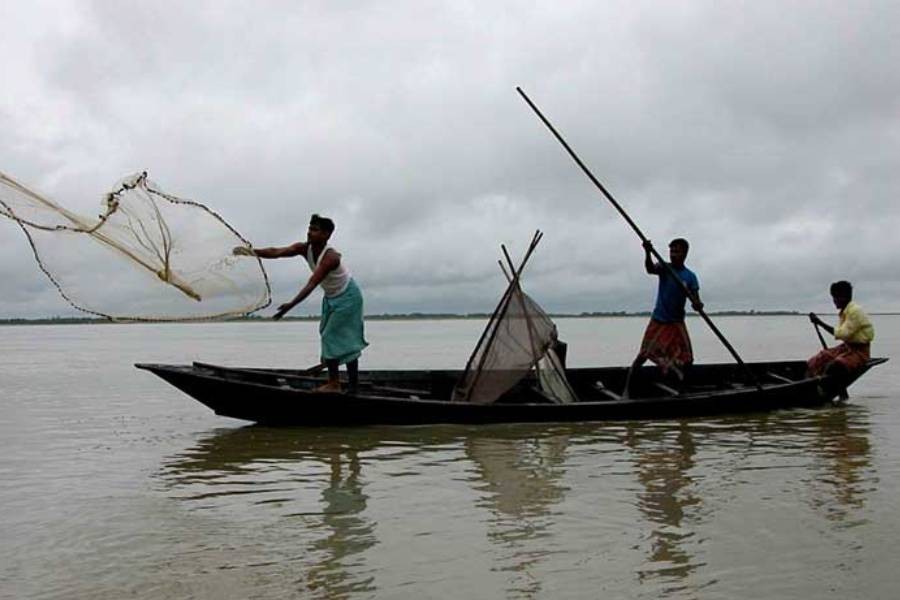With the country's population rising, the government must devise ways and means to increase fish production through the best use of existing natural water resources, especially major rivers and their tributaries. From time immemorial, fish has been meeting the protein requirement for human body in this riverine region. Bangladesh is endowed with scores of mighty rivers and their numerous tributaries, marshes and canals crisscrossing the country. They must be saved.
Apart from natural breeding of fishes in different water bodies including rivers, fishes are grown by undertaking pisciculture projects. Many such projects have sprung up in different parts of the country in recent times. But then due to continuous human interventions in the last couple of years, the biodiversity of the rivers together with the Haors is on the verge of extinction in the country.
The mighty rivers, their innumerable tributaries and Haors in Sylhet, Sunamganj, Habiganj, Moulvibazar, Netrakona, Kishoreganj and Brahmanbaria were once considered as the food basket of the country. Those were the natural repositories of many species of delicious fishes. But the fish and other resources of these rivers and Haors are declining fast. Once there were many varieties of naturally bred fish in the water bodies of the country but some varieties have faced extinction due to widespread use of poisonous pesticides, insecticides and chemical fertilisers in croplands. Catching of mother fishes during the breeding period and fish fry with current nets are no less responsible for the declining fish production.
Everyone knows that rivers are the lifeline and fish breeding grounds of a country like Bangladesh. Without rivers flowing free and pure the whole economy will become crippled and the life of the riverine country's people will come to a standstill. Our experience is that in regard to river pollution warning, demolition and all other measures proved futile and grabbing continues which is an unpardonable serious crime. The mind boggling questions that crops up now are who the persons are involved in encroaching and grabbing rivers in the country? It is certain that the poor people did not encroach or grab anyway. It is the influential quarters who are engaged in grabbing even the bed of rivers in some places. Are they mightier than the arms of law which cannot reach them?
Most of the rivers in the country have almost dried up by now; those are clogged and in death throe. The economy will be in uncharted waters unless the navigability of the rivers and the breeding ground of fishes like rivers are restored. But that is not possible if the practice of encroachment and grabbing is not stopped once for all. The imposition of hefty fine is not enough for such crime nor is it a panacea for halting the offence of encroachment and grabbing. People think that any person engaged in encroachment and grabbing must be dealt with heavy hand. Besides heavy fine, they should be penalised and meted out exemplary punishment and compelled to pay compensation in bulk for the damage already done.
Regular dredging of rivers is necessary to keep them free from pollution and fit for navigability and fishes to live. The government should protect the existing rivers and other water bodies in the interest of increasing fish production in the country. Survival of millions of fishermen is dependent on fish resources for their livelihood. So, it is the responsibility of the relevant authorities to protect their interest. Public awareness in this regard should also be built. Grabbing of rivers and wetlands by a section of influential people is contributing to the shrinkage of the country's rivers and wetlands. The rivers and water bodies across the country are gradually shrinking day by day. Besides, many ponds and water bodies are lying unutilised throughout the country in the absence of proper care and maintenance. Those should be reclaimed and brought under fish cultivation.
In addition provision of bank loans on easy terms and conditions and adequate training to the fishermen, fish culturists, particularly jobless youths, can give impetus in this regard. Poisoning of valuable fish in rivers, ponds and other water bodies makes newspaper headlines very often. Under the circumstance, vigilance on the part of the appropriate authorities, fish culturists and rural volunteers, particularly at night can stop this menace. Conservation of the rivers, water resources and other wetlands has become indispensable for the sake of boosting fish production. The rivers and other water resources should be freed from encroachment, grabbing for navigability and all sorts of pollution and contamination should be stopped so that the indigenous fish species can be saved from extinction. Today's slogan should be: save the rivers, save the country and save the fishes for the sake of growing prosperity of the countrymen.
The writer is a former Staff Economist, Pakistan Institute of Development Economics, Karachi, Staff Reporter of now defunct Morning News, Dhaka, Deputy Field Surveillance Supervisor, ISRT, DU. and retired Professor of Economics and Vice Principal of Cumilla Government Women's College, Cumilla.


